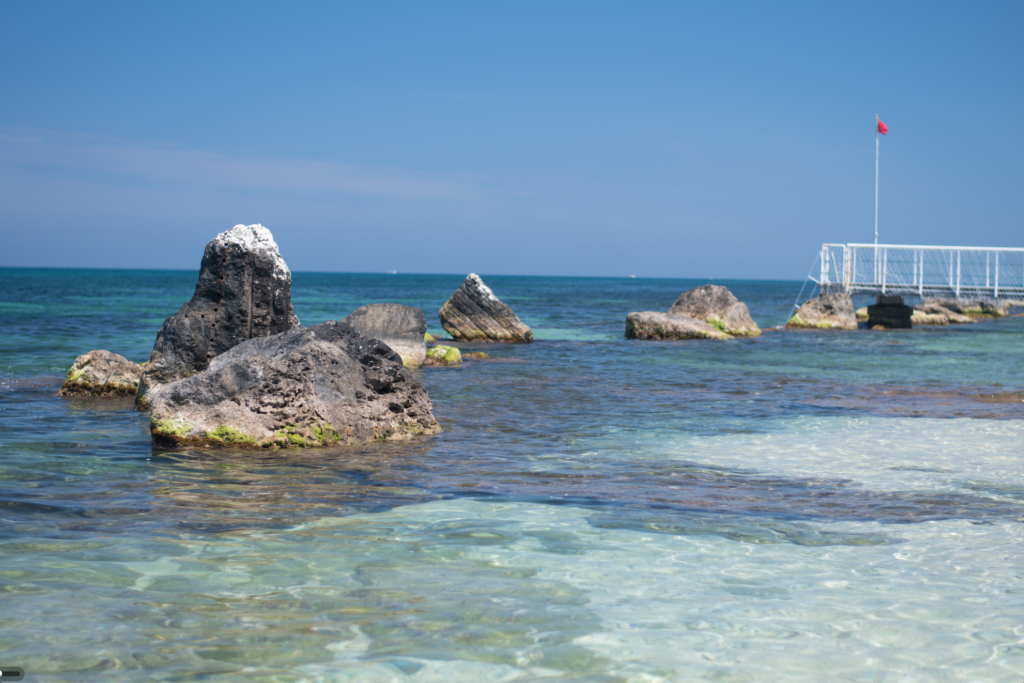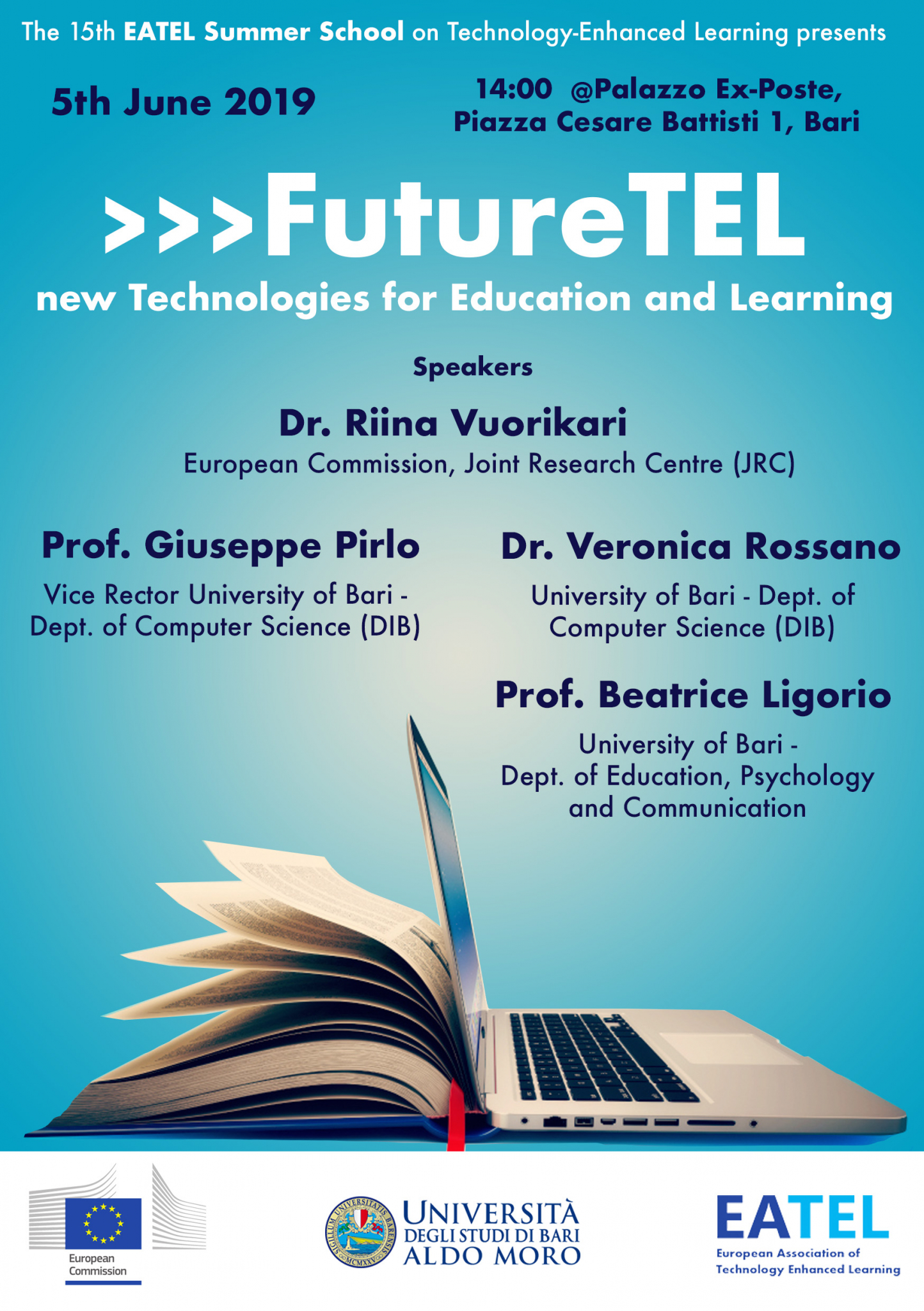(picture by Bibeg Limbu)
Took me a while to wrap my thoughts about JTELSS19 what I believe was the best summer school I ever been so far - the 15th EATEL Summer School (jTELSS19) https://ea-tel.eu/jtelss/jtelss2019/
The summer school is the European event for junior researchers in the field of educational technologies, and it gathered 87 PhD students and senior researchers from 23 countries.
The event took place in the first week of June 1 - 8th June in Giovinazzo, Bari, Italy and this time, I had the pleasure of being the local chair organising the logistics and organisational aspects of the summer school.
This year’s summer school was a definite success determined both by the attractive location of the coasts of the Apulia region and by the rich program the summer school offered. All participants engaged in group activities, including thematic workshops in research topics like learning analytics, data visualisation, multimodality, collaboration, game-based learning, smart cities, blockchain and big data. Participants had a chance to present their research in the poster session, get inspired in the keynote session, generate innovative ideas in the idea generation session, talk with more experienced researchers during the speed-mentoring session and prepare for the Doctoral Consortium which will take place in the leading conference EC-TEL in September 2019 at TU Delft, The Netherlands.
But let's proceed with order looking at what made this summer school special.
Rich program
The five days program featured 47 sessions including 6 keynotes, 20 thematic workshops, 11 methodology workshops and several informal and social activities. (check the full program here)
Stunning location
Hotel Riva del Sole in Giovinazzo, the city of Bari and its Apulia region was the best location where to run the summer school. Sunny coasts, blue sea, close to Bari international airport and full of touristic attractions. Bari is an emerging city with different local universities which touch in some ways topic to Technology Enhanced Learning.
#JTELSS19 is about to start. Check out our location this year! @RivaDelSoleBari pic.twitter.com/A9Oq6MCJZQ
— JTELSS (@jtelss) June 1, 2019
Bari, Apulia region #JTELSS19 pic.twitter.com/3NoUTXGsqA
— Dr Tina Papathoma (@aktinaki) June 5, 2019
We organised two excursions, the first one through the Caves of Castellana, the Trulli of Alberobello and Polignano, and the second one in the old town of Bari.
Great start of #JTELSS19 today! We visited some of the best parts of Puglia: Grotte di Castellana and Alberobello.
Now we're ready for the scientific programme during the next 5 days!#phdchat #phdlife #EdTech #TEL #SummerSchool pic.twitter.com/s7r1wdsdI7— Anna Vasilchenko (@AnnaVasilchenko) June 2, 2019
High-level keynotes
We had one keynote for each day of the summer school plus one evening keynotes:
- Marco Kalz Professor, Heidelberg University of Education, Germany
- Rebecca Ferguson, Senior Lecturer, The Open University, United Kingdom,
- Riina Vuorikari, Joint Research Centre (JRC), European Commission,
- Roberto Martinez-Maldonado, Researcher, University of Technology Sydney, Australia,
- Donald Clark, EdTech Entrepreneur, CEO, Professor, Researcher, Blogger and Speaker, UK.
#JTELSS19 Keynote 1: Unintended consequences of mainstreaming of technology-enhanced learning by @mkalz
Such a rich talk on modern TEL: different perspectives, opposite points of view, cuases and effects, inclusion and divides, theory and practice, learning vs education & more! pic.twitter.com/MQdgsepyno— JTELSS (@jtelss) June 3, 2019
Keynote 2 at #JTELSS19: "Innovating pedagogy: enhancing learning" by Rebecca Ferguson @R3beccaF from the Open University. pic.twitter.com/NtHPwETziM
— JTELSS (@jtelss) June 4, 2019
Explanatory visualizations and how to make them at the #jtelss19 workshop "Data visualization in #TEL" by @RobertoResearch and @IoanaJJ pic.twitter.com/qXVRqi2SBg
— JTELSS (@jtelss) June 7, 2019
Keynote 5 at #JTELSS19 "AI changes everything – why AI will change online learning and its design" by Donald Clark @DonaldClark#AI #edTech pic.twitter.com/UbwO7SmxoV
— JTELSS (@jtelss) June 7, 2019
Dr. Riina Vuorikari @vuorikari from the European Commission, Joint Research Centre (JRC - @EU_ScienceHub) talks about the Highlights of the European agenda for teaching and learning with digital technologies
at the FutureTEL Open Seminar at #JTELSS19 https://t.co/z2oCAvZdtS pic.twitter.com/1MrtVRdFBu— JTELSS (@jtelss) June 5, 2019
Local research community day
On Wednesday 5th June we organised a day to get in touch with the local research community. We first visited the Fablab Poliba in Bitonto town where we had a session on idea generation from both a business and research perspective. Then we organised >>>FutureTEL an open seminar with local researchers in technology-enhanced learning which was a great exchange and interesting experience to building bridges between local and international communities.
Happening now: I learnt that Fablab was borne out of sheer randomness/ by chance ; perhaps that’s what innovations are about #JTELSS19 #technologyenhancedlearning pic.twitter.com/4BZq1pNh8P
— Esther Tan (@taneste) June 5, 2019
FutureTEL Open Seminar at #JTELSS19, part II panel with #TEL experts from Bari:
Prof. Dr. Giuseppe Pirlo
Dr. Veronica Rossano
Prof. Dr. Beatrice Ligoriohttps://t.co/z2oCAvZdtS pic.twitter.com/WEcD8Tuesz— JTELSS (@jtelss) June 5, 2019
OUNL representation
Continuing the tradition established in the previous years, the TELI group of the Welten Institute of the Open University in The Netherlands had a leading role in the organisation of this Summer School. Eleven TELI researchers attended the event taking an active part in the organisation of 13 sessions and making OUNL the most represented and active institution in the summer school. Among the TELI researchers, Daniele Di Mitri was the local chair of the summer school, while Maren Scheffel and Roland Klemke were part of the Program Committee.
Attendees of JTELSS19 from TELI (in the pic from left to right): Peter Ebus, Bibeg Limbu, Martine Schophuizen, Somayeh Zamani, Aodhán Kelly, Maren Scheffel, Sambit Praharaj, Roland Klemke, Ekaterina Muravyeva, Daniele Di Mitri, Ioana Jivet.
The sessions where the OUNL team was involved were:
- Academic writing in TEL (part I) by Jan Schneider & Maren Scheffel
- Expertise Modelling using Augmented Reality sensors for training by Bibeg Limbu & Roland Klemke
- Presenting research, part I: public speaking by Jan Schneider & Maren Scheffel
- Commercialization of research and European research funding: Idea generation session by Endrit Kromidha, Daniele Di Mitri, Maria Perifanou, Mikhail Fominykh & Ana Torres
- Multimodal Tutor by Daniele Di Mitri & Jan Schneider
- Do’s and Don’ts in TEL Statistics by Peter Ebus
- Research ethics and informed consent by Ekaterina Muravyeva & Maren Scheffel
- Choose 2: Enough sleep, PhD, Social life - Balancing PhD life and supervisor relationship!? by S. Praharaj, R. Klemke, M. Scheffel, B. Limbu & J. Schneider
- Portable co-located collaboration support in real-time by Sambit Praharaj & Maren Scheffel
- Data Visualization in TEL by Roberto Maldonado & Ioana Jivet
- Presenting research, part II: promotion and communication by Maria Perifanou, Mikhail Fominykh & Daniele Di Mitri
- Academic writing in TEL (part II) Jan Schneider & Maren Scheffel
- Learn to fight irrational fears with data-driven approaches by Roland Klemke, Ellen Rusman & Somayeh Zamani
- Culturally sensitive learning analytics tools Ioana Jivet & Ekaterina Muravyeva
Stronger community
For PhD students, the jTEL summer school represents a unique occasion to network with other doctoral students and share their research ideas and current struggles. The jTEL summer school aims at building a robust research community around the field of Technology Enhanced Learning and fostering future research and business collaboration among attendees. The jTEL summer school is also the chance for peer support to overcome the sense of isolation and frustration that PhD students usually experience during their research.
#jtelss19 sharing TEL projects' ideas: an excellent way to strengthen the TEL community, building research skills for the future! Not only TEL PhDs benefit, but also the whole research community @mariaperif pic.twitter.com/Als8PNDW47
— Juliana Raffaghelli @LaRaffa@xarxa.cloud (@JulianaR71) June 5, 2019
https://twitter.com/MJFSchophuizen/status/1137064518377451520
Goodbye #Bari goodbye #JTELLSS19! One of the best summer schools in recent years! Looking forward to the next one! pic.twitter.com/HPAt5dwF1J
— Alexander Mikroyannidis (@alexmikro) June 7, 2019






